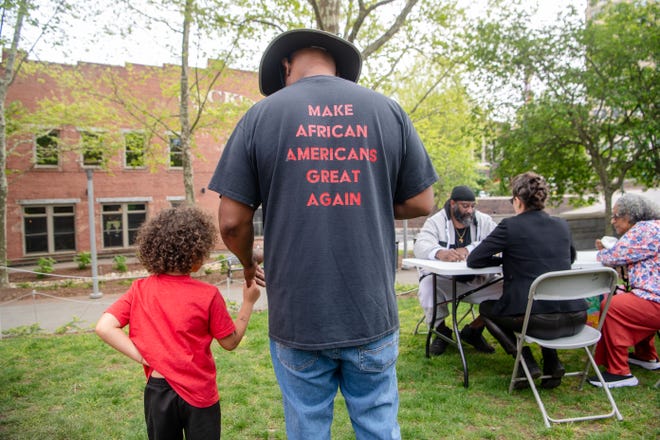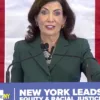
ASHEVILLE – The city and county reparations commission has voted unanimously for guaranteed income for some residents, handing that and other recommendations up to local elected officials.
In a series of four votes at its May 6 meeting, the commission recommended guaranteed income and three other programs − the creation of an economic development center, paying for existing initiatives in historically Black neighborhoods and creating a Reparations Accountability Council. All are meant to help make up for slavery and years of discrimination toward Black residents and their ancestors − though it is still unclear who exactly will benefit because of legal issues that can limit race-based programs, city and county attorneys have said.
“You have officially moved forward and voted on four of your recommendations. This deserves celebration,” said Vernisha Crawford, facilitator for the commission that has toiled to shape what reparations would look like since the City Council and Buncombe County Board of Commissioners approved them in historic votes in 2020. Making the motion to initiate the vote on guaranteed income and some of the other items was commission member and former City Council member Keith Young who pushed through the reparations vote four years ago.
“I support the recommendation and all the others,” Young said.
There is no scheduled date yet for the local governments to take up the items.
The commission did not recommend an amount that people should receive, though $600 is a monthly allotment paid to qualifying residents in Durham, a city whose program local proponents have referenced.
In Asheville and the rest of the county, guaranteed income should be “a way to ensure basic needs are met for individuals with low-incomes and assets,” according to the language of the recommendation in the May 6 agenda.
That description noted that 100 other cities provide guaranteed income, a type of direct payment not among initial proposals when elected officials voted for reparations four years ago. Such payments are unconditional with no strings attached, such as work requirements. They are also meant to supplement, rather than replace “the existing social safety net and can be a tool for racial and gender equity,” the recommendation said.
The commission said the recommended accountability council should work with city and county government to hash out details. But, specifically, the payments should “benefit individuals who have been harmed by historic, systemic and ongoing wage and employment discrimination.”
Populations to be considered are public housing residents, individuals and families below the poverty level, people leaving jail and prison and single mothers, the language of the recommendation said.
Some commission members, though, wanted the programs to be more directly targeted at Black people.
UNC Asheville professor Dwight Mullen, speaking during the meeting, pushed back on the idea that race-based programs would run afoul of the law.
“It’s completely within legal parameters to counter a negative discrimination,” Mullen said. “I refuse to accept that talking about Black folk is unconstitutional.”
But some noted how other ongoing programs had taken measures to avoid a direct race-based approach. Durham, for example, distributes guaranteed income to those who have faced negative consequences under the criminal justice system.
“The thing that Durham did was to target it specifically to…justice-involved individuals and as you all know, that is disproportionately Black people,” said commission member and long-time racial justice activist Dee Williams.
One key difference is that Durham’s program is funded privately, while Buncombe’s, as currently described, is taxpayer funded, said County Attorney Michael Frue.
“The solution could be a private source of funding,” Frue said.
More:Historic reparations commission slated for final recommendations in June. Then what?
Reparations Commission of Asheville’s Community Reparations Jamboree at Pack Square Park
Joel Burgess has lived in WNC for more than 20 years, covering politics, government and other news. He’s written award-winning stories on topics ranging from gerrymandering to police use of force. Got a tip? Contact Burgess at jburgess@citizentimes.com, 828-713-1095 or on Twitter @AVLreporter. Please help support this type of journalism with a subscription to the Citizen Times.


